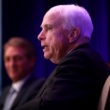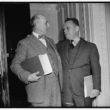THE P.O.W. CELEBRITY—Longtime McCain friend and consultant John Weaver has said that John McCain was a media celebrity when he first got off the transport from Vietnam in 1973. After a couple of years in physical rehab, McCain parlayed his celebrity status into a position as a Navy liaison officer to the U.S. Senate in Washington. There, the Navy and McCain cheerfully used each other to promote their agendas among the politically powerful. In 1980, McCain even arranged to marry his mistress, Cindy Hensley, in Washington rather than Arizona. The D.C. venue would serve to deepen McCain’s political contacts in a way that Phoenix or Sedona could not. In addition to having Gary Hart as a groomsman, McCain asked then-Republican senator and future Clinton Defense Secretary Bill Cohen of Maine to be his best man.
McCain’s residency was a problem. Arizona Republicans didn’t know much about him—aside from his status as the nation’s celebrity Vietnam spokesman. Consequently, voters and the press paid more attention to McCain’s rivals: a pro-business, conservative state senator and a woman in the state house who had earned a national reputation as a populist conservative crusader against the Equal Rights Amendment and abortion rights.
“Listen, pal. I spent twenty-two years in the Navy. My grandfather was in the Navy. We in the military service tend to move a lot. We have to live in all parts of the country, all parts of the world. I wish I could have had the luxury, like you, of growing up and living and spending my entire life in a nice place like the First District of Arizona, but I was doing other things. As a matter of fact, when I think about it now, the place I lived longest in my life was Hanoi.”
McCain’s “P.O.W. response” became the perfect political cover and non-answer to tough questions, even as the press dutifully continued to report that McCain didn’t like to discuss his years in captivity.
NICE DEAL IF YOU CAN GET IT—Sometimes the POW response doesn’t work and McCain has to react to circumstances by responding to, or even cozying up to, the press—as he did in 1994 when he helped his wife avoid prosecution for the theft of thousands of dollars’ worth of prescription drugs from a non-profit foundation she directed.
Today show to discuss their “personal tragedy.” And Napolitano used the respite from the attacks of powerful opponents to build the political base that helped make her governor.
Cindy’s confession, redemption, and rehabilitation story provided great national headlines for the McCain family and made them seem more human. But it didn’t play in Phoenix. The state’s largest paper, the conservative Arizona Republic, published an editorial that accused McCain and the state’s GOP of a deplorable double standard:
Westword. “You expect common people to live in fear, but the children of politicians are the first one to get off.” Bush campaign operatives eagerly (and discreetly) circulated the judge’s comments during the 2000 campaign, but the press gave the story a pass.
McCAIN VS. FEINGOLD—McCain’s record as a reformer has always been a bit dodgy. For example, people forget that original McCain-Feingold campaign-finance reform legislation would have banned PACs as well as soft-money advertising by political parties. Even though this provision didn’t make it into the bill that was signed into law, Wisconsin Democrat Russ Feingold decided to comply with it—a decision that nearly cost him his seat in the Senate. In his 1998 re-election campaign, Feingold expanded his policy to refuse PAC donations and soft money ads by imposing a spending cap of “$1 per Wisconsin resident,” or $3.8 million. Feingold even doubled down on his no-soft-money position, threatening to match every dollar party committees spent on his race with cuts in campaign spending. While Feingold was adhering to the letter and spirit of the campaign finance law that he and McCain had sponsored, Feingold’s opponent, millionaire Congressman Mark Neumann, was greatly outspending Feingold with funds from his campaign committee—and millions in issue ads.
McCain’s pick of Sarah Palin to be his running mate is another example of his instinct to react impulsively. In the first news cycle after McCain selected Palin, many in the media focused on the Alaska governor’s right-wing views or her experience—or the lack thereof.
New York Times reported that up to the eleventh hour, John McCain wanted Joe Lieberman as a running mate. But McCain could not sell the independent senator from Connecticut to the G.O.P.’s conservative Christian base. To “shake things up,” McCain selected a woman he had spoken with for less than two hours before choosing her.
Peter Lindstrom is a political consultant in Washington, D.C. His observations on John McCain’s career help to explain the findings of a recent survey by George Mason University’s Center for Media and Public Affairs: In the first six weeks of the general election, evening-news reporting by the three major television networks was critical of John McCain 43 percent of the time, and critical of Barack Obama 72 percent of the time.





0 Comments